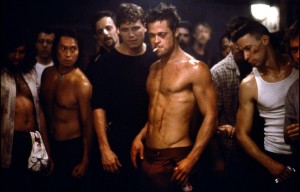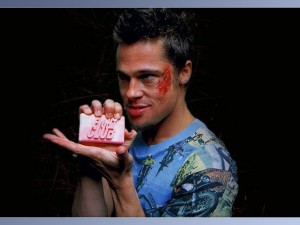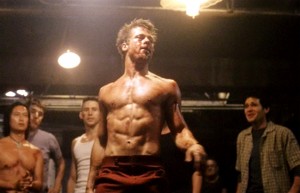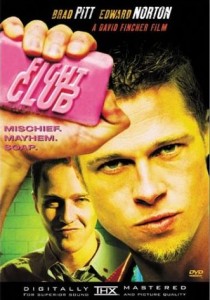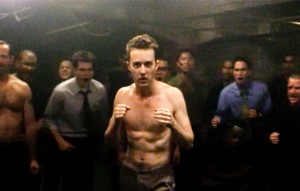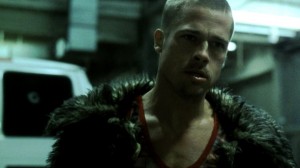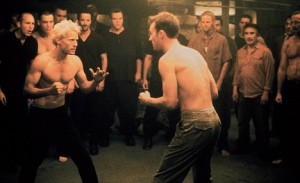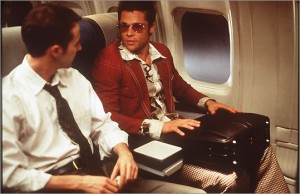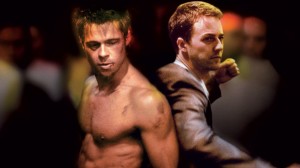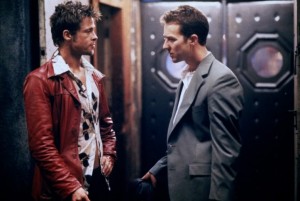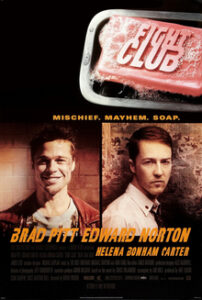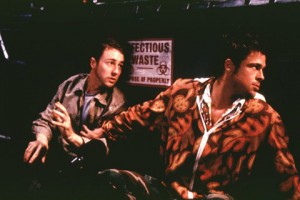Fight Club ***** (1999, Brad Pitt, Edward Norton, Helena Bonham Carter, Meat Loaf, Jared Leto) – Classic Film Review 333
‘The first rule of Fight Club is you do not talk about Fight Club.’
British director David Fincher’s brilliant 1999 cult movie satire Fight Club is a totally shocking, disturbing, adrenaline pumping and provocative experience. An astounding looking, complicated, adult film, it is unique. Its closest relatives are American Psycho, Crash and American Beauty, but they are distant cousins.
Losing 20lbs for the role, Edward Norton stars as The Narrator, a ticking-time-bomb of an insomniac office worker who is looking for a radical way to change his life. He sure finds it. Brad Pitt also stars as Tyler Durden, the slippery devil-may-care soap maker/ salesman whom Norton encounters. They form an illegal underground fight club and the gloves are off.
The duo soon find their concept of channelling primal male aggression into a new form of therapy catches on, with underground fight clubs forming in every American town. But, after a while, things start to plummet in an out-of-control downward spiral.
Based on Chuck Palahniuk’s novel with its riveting premise, the screenplay by Jim Uhls is taut, lean and provocative. Palahniuk had the idea after being beaten up on a camping trip on complaining to nearby campers about the noise of their radio. When he returned to work, nobody mentioned or acknowledged his injuries.
The acting by both stars is electric. As Norton’s now in a bit of a post-Hulk career slump, it’s important to remind yourself what an outstanding performer he is. Pitt is as extraordinary as Norton. Effectively cast against type, Helena Bonham Carter also lands an excellent role as Marla Singer, after Reese Witherspoon turned the film down as being ‘too dark’. During the shooting of their sex scene, Pitt and Bonham Carter posed in ten different positions from the Kama Sutra. Lucky, Helena!
Fight Club profitably reunites Pitt with his director on Seven (1995), David Fincher, whose direction here is again imaginative and inspired, obsessively shooting over 1,500 reels of film, more than three times the usual amount for a 120 minute film. Significantly, Jeff Cronenweth’s ‘dirty patina’ cinematography is eye-catchingly atmospheric and quite stunning.
Also remarkable are the 72 sets constructed by production designer Alex McDowell. These help to ensure that it is such an amazing looking film, meticulously made in shooting that lasted 138 days, with more than 300 scenes filmed on 200 locations.
It is almost incredible that a major film studio like 20th Century Fox would back it. It was lucky to enjoy supporters and people who really believed in it. Not everyone liked it, though. Owner Rupert Murdoch hated the project and clashed with then-studio head Bill Mechanic, who left his job not long after the release.
The novel was discovered in galley form by Fox executive, Raymond Bongiovanni, who worked tirelessly to get it filmed. He sent it to Fox Production President Laura Ziskin, who thought it was a tremendous piece of literature but would not necessarily make a great movie. A studio reader evaluated its potential in a report that said ‘it could never be made into a film’. It was ‘exceedingly disturbing’, ‘volatile and dangerous’, and would ‘make audiences squirm’. Ziskin decided to go ahead anyway.
But at the time there wasn’t really a happy ending. The projected $50 million budget escalated to $67 million, endangering the chance of profitability, and there were disappointing box office returns relative to cost. It grossed only $37 million in the US and £5 million in the UK. No wonder, when publicists tried to keep critics away from seeing it to review it. And it was totally neglected at awards time.
Nevertheless, there is a kind of happy ending finally after all. The film was a hit on its home video release, prompting its re-evaluation as a cult classic. It is now number 10 movie on the IMDb’s top 250 and it was voted number 4 in Total Film’s list of 100 Greatest Movies Of All Time. And Palahniuk’s view is that the film is an improvement on his novel. It was influential too. Several fight clubs were later reported to have started in the US. A Gentleman’s Fight Club was formed in Menlo Park, California in 2000 and had members mostly from the high tech industry.
The stars took lessons in boxing, taekwondo and grappling, and soap-making classes from boutique company Auntie Godmother. Pitt visited a dentist to have his front tooth chipped. At Fincher’s urging, Norton actually hit Pitt hard on the ear in what was intended as a fake swing. Making use of his finely tuned body, Pitt went on to play a boxer again in next year’s Snatch.
Fight Club experienced the expected inevitable censorship problems. There were calls to ban it in the UK but the BBFC approved it for UK cinema release after it cut four seconds from two scenes. In the scene where Lou (Peter Iacangelo) beats up Tyler (Pitt), an overhead shot as Tyler receives a punch to the face is missing, and in the scene where The Narrator (Norton) beats up Angel Face (Jared Leto), the third punch in the first load of hits, as well as several hits as his face becomes bloodied during the last load of hits have been removed. The 2007 Definitive Edition DVD restores the cuts.
The Japanese version cuts the penis shots.
David Fincher is also the director of Alien 3, his debut film. After Fight Club, he re-cast Jared Leto in his next film Panic Room (2002) and Brad Pitt in The Curious Case of Benjamin Button (2008).
The cast are Edward Norton as the Narrator, Brad Pitt as Tyler Durden, Helena Bonham Carter as Marla Singer, Meat Loaf as Bob Paulson, Jared Leto as Angel Face, Holt McCallany as The Mechanic, Zach Grenier as The Narrator’s boss Richard Chesler, Eion Bailey as Ricky, and Peter Iacangelo as Lou.
The films of David Fincher: Alien 3 (1992), Seven (1995), The Game (1997), Fight Club (1999), Panic Room (2002), Zodiac (2007), The Curious Case of Benjamin Button (2008), The Social Network (2010), The Girl with the Dragon Tattoo (2011), Gone Girl (2014), Mank (2020).
Meat Loaf (born Marvin Lee Aday on September 27, 1947) died on January 20, 2022, at the age of 74, reportedly from COVID-19.
http://derekwinnert.com/seven-classic-film-review-19/
http://derekwinnert.com/alien-3-classic-film-review-43/
© Derek Winnert 2013 Classic Movie Review 333
Link to Derek Winnert’s home page for more film reviews: http://derekwinnert.com/

